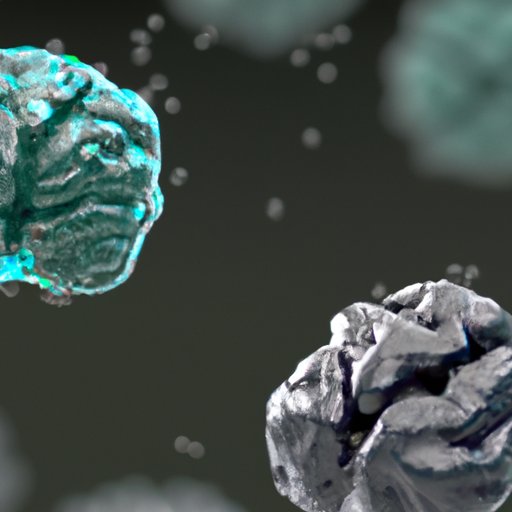
I. Introduction
Prions are unique, infectious agents that cause a variety of diseases in animals and humans. These diseases are often devastating, with no known cure or treatment. Understanding the science behind prion-related diseases is crucial in developing effective prevention and treatment methods.
II. Understanding Prion-Related Diseases: Causes, Symptoms, and Treatment Options
Prion-related diseases are caused by misfolded proteins called prions. These proteins can cause other healthy proteins in the body to fold abnormally, leading to a chain reaction of protein misfolding and aggregation within the brain and nervous system. This process ultimately results in permanent damage to the brain, leading to a range of neurological symptoms and fatal illness.
There are several different types of prion-related diseases, including Creutzfeldt-Jakob disease (CJD), variant Creutzfeldt-Jakob disease (vCJD), bovine spongiform encephalopathy (BSE), also known as “mad cow disease,” and chronic wasting disease (CWD).
The causes of prion-related diseases are not yet fully understood. However, it is believed that prions can be transmitted through contaminated meat, ingestion of contaminated products, or genetic transmission.
Common symptoms of prion-related diseases include memory loss, personality changes, difficulty walking, speech disturbances, and insomnia. Currently, there is no known cure for these diseases, and treatment options are limited to managing symptoms.
III. The Mysterious World of Prions: Unraveling the Science Behind Prion-Related Diseases
Prions are unique because they are not living organisms, but rather abnormal proteins. Unlike viruses and bacteria, prions do not have any genetic material or enzymes to facilitate their replication.
Prions can bind to healthy proteins and cause them to misfold and clump together, forming amyloid plaques within the brain and nervous system. These amyloid plaques ultimately lead to permanent damage to the brain, causing severe neurological symptoms and death.
IV. Uncovering the Link Between Prions and Neurodegenerative Diseases
Neurodegenerative diseases are characterized by a progressive loss of neurons and a decline in cognitive function. Alzheimer’s disease, Parkinson’s disease, and Huntington’s disease are examples of these types of diseases.
Recent studies have suggested that prions may be involved in the development of neurodegenerative diseases. It is believed that the misfolding and aggregation of proteins within the brain and nervous system may play a role in the development of Alzheimer’s and other similar diseases.
V. Mad Cow Disease and Other Prion-Related Illnesses: What You Need to Know
Mad cow disease, or BSE, is a prion-related disease that primarily affects cattle. The disease can be transmitted to humans through the consumption of contaminated meat.
Symptoms of mad cow disease in humans include dementia, muscle stiffness, and difficulty with coordination and movement. In addition to mad cow disease, there are several other prion-related illnesses that can affect both animals and humans, including chronic wasting disease and kuru.
VI. Prions: The Culprit Behind Fatal Brain Diseases
Prion-related fatal brain diseases include several types of CJD and vCJD. These diseases are characterized by rapid neurodegeneration and an average survival time of only a few months.
The causes of prion-related fatal brain illnesses are not yet fully understood. However, it is believed that the ingestion of contaminated meat or exposure to contaminated equipment or medical procedures may increase the risk of developing these diseases.
Common symptoms of prion-related fatal brain illnesses include rapid cognitive decline, muscle stiffness, and difficulty with coordination and movement. Sadly, there is currently no known cure for these diseases, and treatment options are limited to managing symptoms.
VII. The Alarming Rise of Prion-Related Diseases and Its Global Impact
The incidence of prion-related diseases is on the rise, particularly in developing countries where unsafe food practices are more common. The global impact of these diseases is significant, with economic losses in the livestock industry and a high social cost due to the loss of human life.
Preventing the spread of prion-related diseases is crucial in reducing the incidence of these illnesses. Improved food safety measures and early detection can help limit the spread of prion-related illnesses.
VIII. Prion Infections: How They Spread and Why Early Detection is Crucial
Prion infections are typically spread through contaminated meat, especially from infected animals. In addition, medical equipment or procedures that come into contact with infected tissue can transmit prion-related diseases.
Early detection of prion infections is crucial in reducing the spread of these diseases. Rapid response protocols are essential in identifying and managing potential outbreaks, particularly in countries where unsafe food practices are common.
IX. Conclusion
Prion-related diseases are a significant public health concern due to their high impact on both animal and human health. A better understanding of the science behind these diseases is necessary for developing effective prevention and treatment methods.
Further research is needed to gain a better understanding of prion-related diseases, including the causes and mechanisms of action. Ensuring food safety measures are in place and increasing awareness of prion-related diseases can help reduce the incidence of these illnesses.
Ultimately, continued research and awareness are necessary to effectively address prion-related diseases and their impact on human and animal health.




